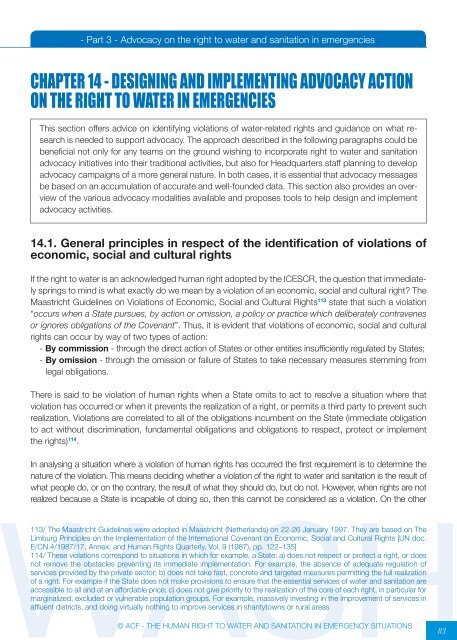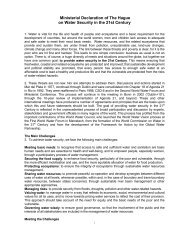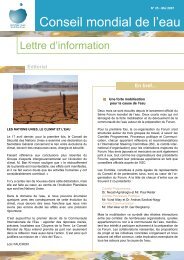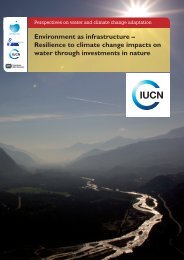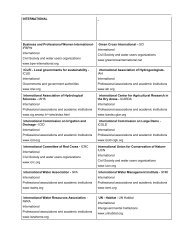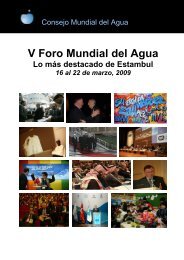the human right to water and sanitation in emergency situations
the human right to water and sanitation in emergency situations
the human right to water and sanitation in emergency situations
Create successful ePaper yourself
Turn your PDF publications into a flip-book with our unique Google optimized e-Paper software.
- Part 3 - Advocacy on <strong>the</strong> <strong>right</strong> <strong>to</strong> <strong>water</strong> <strong>and</strong> <strong>sanitation</strong> <strong>in</strong> emergencies<br />
CHApTER 14 - DESIGNING AND IMplEMENTING ADvOCACY ACTION<br />
ON THE RIGHT TO WATER IN EMERGENCIES<br />
This section offers advice on identify<strong>in</strong>g violations of <strong>water</strong>-related <strong>right</strong>s <strong>and</strong> guidance on what research<br />
is needed <strong>to</strong> support advocacy. The approach described <strong>in</strong> <strong>the</strong> follow<strong>in</strong>g paragraphs could be<br />
beneficial not only for any teams on <strong>the</strong> ground wish<strong>in</strong>g <strong>to</strong> <strong>in</strong>corporate <strong>right</strong> <strong>to</strong> <strong>water</strong> <strong>and</strong> <strong>sanitation</strong><br />
advocacy <strong>in</strong>itiatives <strong>in</strong><strong>to</strong> <strong>the</strong>ir traditional activities, but also for Headquarters staff plann<strong>in</strong>g <strong>to</strong> develop<br />
advocacy campaigns of a more general nature. In both cases, it is essential that advocacy messages<br />
be based on an accumulation of accurate <strong>and</strong> well-founded data. This section also provides an overview<br />
of <strong>the</strong> various advocacy modalities available <strong>and</strong> proposes <strong>to</strong>ols <strong>to</strong> help design <strong>and</strong> implement<br />
advocacy activities.<br />
14.1. General pr<strong>in</strong>ciples <strong>in</strong> respect of <strong>the</strong> identification of violations of<br />
economic, social <strong>and</strong> cultural <strong>right</strong>s<br />
If <strong>the</strong> <strong>right</strong> <strong>to</strong> <strong>water</strong> is an acknowledged <strong>human</strong> <strong>right</strong> adopted by <strong>the</strong> ICESCR, <strong>the</strong> question that immediately<br />
spr<strong>in</strong>gs <strong>to</strong> m<strong>in</strong>d is what exactly do we mean by a violation of an economic, social <strong>and</strong> cultural <strong>right</strong>? The<br />
Maastricht Guidel<strong>in</strong>es on Violations of Economic, Social <strong>and</strong> Cultural Rights 113 state that such a violation<br />
“occurs when a State pursues, by action or omission, a policy or practice which deliberately contravenes<br />
or ignores obligations of <strong>the</strong> Covenant”. Thus, it is evident that violations of economic, social <strong>and</strong> cultural<br />
<strong>right</strong>s can occur by way of two types of action:<br />
- By commission - through <strong>the</strong> direct action of States or o<strong>the</strong>r entities <strong>in</strong>sufficiently regulated by States;<br />
- By omission - through <strong>the</strong> omission or failure of States <strong>to</strong> take necessary measures stemm<strong>in</strong>g from<br />
legal obligations.<br />
There is said <strong>to</strong> be violation of <strong>human</strong> <strong>right</strong>s when a State omits <strong>to</strong> act <strong>to</strong> resolve a situation where that<br />
violation has occurred or when it prevents <strong>the</strong> realization of a <strong>right</strong>, or permits a third party <strong>to</strong> prevent such<br />
realization. Violations are correlated <strong>to</strong> all of <strong>the</strong> obligations <strong>in</strong>cumbent on <strong>the</strong> State (immediate obligation<br />
<strong>to</strong> act without discrim<strong>in</strong>ation, fundamental obligations <strong>and</strong> obligations <strong>to</strong> respect, protect or implement<br />
<strong>the</strong> <strong>right</strong>s) 114 .<br />
In analys<strong>in</strong>g a situation where a violation of <strong>human</strong> <strong>right</strong>s has occurred <strong>the</strong> first requirement is <strong>to</strong> determ<strong>in</strong>e <strong>the</strong><br />
nature of <strong>the</strong> violation. This means decid<strong>in</strong>g whe<strong>the</strong>r a violation of <strong>the</strong> <strong>right</strong> <strong>to</strong> <strong>water</strong> <strong>and</strong> <strong>sanitation</strong> is <strong>the</strong> result of<br />
what people do, or on <strong>the</strong> contrary, <strong>the</strong> result of what <strong>the</strong>y should do, but do not. However, when <strong>right</strong>s are not<br />
realized because a State is <strong>in</strong>capable of do<strong>in</strong>g so, <strong>the</strong>n this cannot be considered as a violation. On <strong>the</strong> o<strong>the</strong>r<br />
113/ The Maastricht Guidel<strong>in</strong>es were adopted <strong>in</strong> Maastricht (Ne<strong>the</strong>rl<strong>and</strong>s) on 22-26 January 1997. They are based on The<br />
Limburg Pr<strong>in</strong>ciples on <strong>the</strong> Implementation of <strong>the</strong> International Covenant on Economic, Social <strong>and</strong> Cultural Rights [UN doc.<br />
E/CN.4/1987/17, Annex; <strong>and</strong> Human Rights Quarterly, Vol. 9 (1987), pp. 122–135]<br />
114/ These violations correspond <strong>to</strong> <strong>situations</strong> <strong>in</strong> which for example, a State: a) does not respect or protect a <strong>right</strong>, or does<br />
not remove <strong>the</strong> obstacles prevent<strong>in</strong>g its immediate implementation. For example, <strong>the</strong> absence of adequate regulation of<br />
services provided by <strong>the</strong> private sec<strong>to</strong>r; b) does not take fast, concrete <strong>and</strong> targeted measures permitt<strong>in</strong>g <strong>the</strong> full realization<br />
of a <strong>right</strong>. For example if <strong>the</strong> State does not make provisions <strong>to</strong> ensure that <strong>the</strong> essential services of <strong>water</strong> <strong>and</strong> <strong>sanitation</strong> are<br />
accessible <strong>to</strong> all <strong>and</strong> at an affordable price; c) does not give priority <strong>to</strong> <strong>the</strong> realization of <strong>the</strong> core of each <strong>right</strong>, <strong>in</strong> particular for<br />
marg<strong>in</strong>alized, excluded or vulnerable population groups. For example, massively <strong>in</strong>vest<strong>in</strong>g <strong>in</strong> <strong>the</strong> improvement of services <strong>in</strong><br />
affluent districts, <strong>and</strong> do<strong>in</strong>g virtually noth<strong>in</strong>g <strong>to</strong> improve services <strong>in</strong> shanty<strong>to</strong>wns or rural areas<br />
© ACF - THE HUMAN RIGHT TO WATER AND SANITATION IN EMERGENCY SITUATIONS<br />
83


